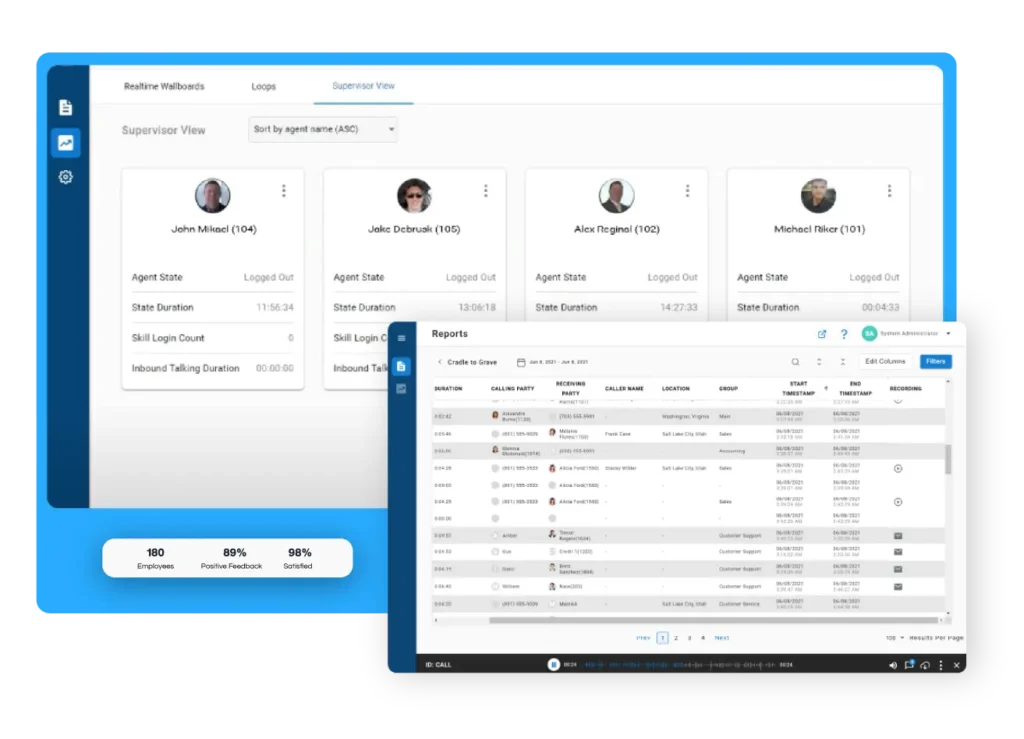Customer expectations have evolved–and so have the tools required to meet them. In today’s fast-paced business landscape, customer service software has become essential for delivering responsive, personalized, and consistent support across every touchpoint. But what is customer service software, exactly?
At its core, customer service software is a suite of tools designed to help businesses manage, track, and optimize customer interactions. From email and chat to phone and social media, it unifies communication channels into a single, streamlined platform. The result? Faster resolution times, more informed agents, and a better experience for every customer.
By providing a centralized hub for communication, customer support software empowers teams with real-time insights, automated workflows, and collaboration tools that reduce friction and boost efficiency. It’s not just about solving issues–it’s about building stronger relationships, improving retention, and driving long-term loyalty.
Whether you’re a growing startup or a large enterprise, the right customer service management software ensures every interaction counts–making it a critical part of any modern business strategy. And if you’re still wondering what is customer service software compared to traditional help desk tools, the difference lies in its depth—offering advanced automation, analytics, and integration capabilities that support teams at every scale.
Defining Customer Service Software
Customer service software is a specialized platform that helps businesses manage, track, and resolve customer interactions across multiple channels–like email, chat, voice, and social media. Unlike general communication tools or CRM systems, this software is purpose-built for support teams, with features that streamline workflows and improve response times.
Customer support software turns every interaction into an opportunity to build trust. It centralizes customer conversations, automates routine tasks, and gives agents the tools and context they need to deliver fast, consistent, and personalized service.
Solutions like cloud contact center software take these capabilities further by enabling flexibility and scalability for distributed teams–making it easier to meet rising customer expectations without adding complexity.
Customer service management software is the engine behind modern support operations–keeping customers satisfied and teams running efficiently.
What Does Customer Service Software Do?
Customer service software is designed to streamline support operations from start to finish. It brings together multiple tools and channels into one platform, making it easier for agents to manage conversations, track customer history, and respond quickly.
By automating repetitive tasks–like ticket routing, status updates, or follow-up emails–the software frees agents to focus on more complex, high-value interactions. It also enhances visibility across the entire customer journey, giving managers real-time insights into performance trends, and areas for improvement.
Whether a company handles a handful of daily inquiries or thousands, the software ensures consistent, efficient, personalized support at scale.
Types of Customer Service Software
There are several types of customer service software, each tailored to different support needs. Choosing the right combination helps teams deliver faster responses and more seamless customer experiences.
- Help Desk Software: Centralizes and organizes incoming requests through a ticketing system, helping agents prioritize and resolve issues efficiently. This is the foundation of most customer support software platforms.
- Live Chat Tools: Allow agents to provide real-time assistance directly from a company’s website or app. Great for a quick resolution and reducing friction during the buying journey.
- VoIP and Call Center Software: Facilitates phone-based support using internet calling. Many platforms also integrate with Interactive Voice Response (IVR), helping route calls intelligently without human intervention.
- CRM-Integrated Platforms: Combine service tools with customer relationship management systems to give agents a complete view of each customer’s history, preferences, and past interactions.
- Customer Service Management Software: Offers broader functionality beyond ticketing–incorporating automation, reporting, and omnichannel support tools for enterprise-level teams.
The best customer service software often includes a mix of these capabilities to cover every interaction type and support scenario.
Key Features of Customer Support Software
Effective customer support software includes a range of powerful features designed to reduce friction, improve efficiency, and create better customer experiences. Here are the most essential ones:
- Omnichannel Support: Handle conversations across voice, email, chat, and social media from a single dashboard—eliminating channel silos and improving response consistency.
- Automated Workflows: Use automation to route tickets, trigger follow-ups, and escalate urgent issues—saving time and reducing manual errors.
- Real-Time Dashboards & Reporting: Gain visibility into key metrics like resolution times, CSAT scores, and agent productivity to make smarter decisions, faster.
- Knowledge Base Management: Equip customers and agents with self-service tools and internal documentation that reduce ticket volume and accelerate issue resolution.
- AI-Powered Insights: Leverage machine learning to identify trends, suggest responses, and prioritize tasks—especially valuable in high-volume support environments.
- Customizable Ticketing System: Organize requests based on priority, status, or topic—ensuring nothing falls through the cracks.
Whether you’re choosing a simple solution or the best customer service software on the market, these features are key to scaling support without sacrificing quality.
Ticket & Case Management
At the heart of most customer service software is robust ticket and case management. Every customer issue—whether it comes in by email, chat, or phone—gets automatically converted into a trackable ticket. From there, the software helps route it to the right agent using tags, custom rules, and escalation paths.
Automated workflows ensure that nothing slips through the cracks, even when volume spikes. Agents can view the full history of a customer’s interactions, prioritize based on urgency, and collaborate internally for faster resolution.
Multi-Channel Support
Today’s customers reach out on their terms—through voice, live chat, SMS, email, and social platforms. Customer support software with multi-channel communications support brings all these conversations into one unified dashboard.
That means no switching between tabs, no fragmented context. Agents can respond in real time, and customers enjoy a seamless experience no matter where they reach out. It’s the kind of flexibility modern businesses need to meet rising expectations.
Automation and AI Capabilities
Modern customer service management software leverages automation and AI to reduce manual work and improve response speed. Chatbots handle FAQs around the clock, while predictive routing ensures inquiries land with the best-suited agent right away.
AI can also suggest canned responses, flag urgent messages, and even analyze sentiment to help agents adjust tone. These capabilities don’t just improve efficiency—they help deliver smarter, more human-like interactions at scale.
Self-Service Options
Great service doesn’t always require a live agent. With self-service tools like searchable knowledge bases, FAQ automation, and customer portals, users can find answers on their own—often faster than submitting a request.
This reduces the load on your support team while increasing overall customer satisfaction. The best customer service software includes easy-to-build self-service hubs that evolve as your business grows.
Benefits of Using Customer Service Software
Investing in customer service software isn’t just about giving your support team better tools—it’s about unlocking long-term business growth. By streamlining operations, improving response quality, and enabling smarter decision-making, the right platform delivers measurable outcomes that touch every corner of your organization. Whether your focus is ROI, retention, or customer loyalty, these systems play a critical role in driving success.
And when exploring benefits, many businesses circle back to the same fundamental question: what is customer service software actually doing behind the scenes to generate such impact? The answer lies in its ability to unify systems, empower agents, and transform support into a scalable, strategic advantage.
Improved Customer Experience & Satisfaction
In today’s on-demand world, customers expect fast, personalized service—on any channel, at any time. Customer support software brings together communication histories, previous issues, and account details into one centralized view, allowing agents to respond with full context and greater empathy.
The result? Shorter wait times, more relevant answers, and a smoother support journey overall. Over time, this translates to increased customer satisfaction scores (CSAT), stronger brand loyalty, and higher retention rates.
Increased Agent Efficiency
Support agents can only be as effective as the tools they’re using. With the best customer service software, agents gain access to real-time data, automation features, and collaboration tools—all from a unified interface.
Automated workflows reduce repetitive tasks like ticket assignment and follow-ups, freeing agents to focus on high-value interactions. Internal notes, shared inboxes, and canned responses further enhance speed and consistency. When agents are empowered to do more with less friction, your entire service operation becomes faster and more cost-effective.
Better Insights with Analytics
One of the most powerful advantages of customer service management software is its ability to transform raw data into actionable insights. Built-in reporting dashboards let you monitor performance in real time—tracking key support metrics like average resolution time, first contact resolution, and customer sentiment.
This data helps you identify where support is thriving and where there’s room to improve. You can spot trends, adjust staffing needs, refine processes, and proactively prevent issues—all of which contribute to a stronger, more responsive customer service strategy.
Choosing the Best Customer Service Software
When selecting customer service software, businesses need to carefully evaluate several factors to ensure they’re choosing the best fit for their needs. Key elements include features, integration capabilities, ease of use, customer support, and scalability.
- Features: Ensure the software includes essential tools like multi-channel support, automation, and robust reporting features. These capabilities directly impact efficiency and customer satisfaction.
- Integration: The software should seamlessly integrate with your existing systems, including CRM platforms, email, and social media tools.
- Ease of Use: Look for an intuitive interface that requires minimal training, allowing your team to get up and running quickly.
- Support: Ensure the vendor provides reliable, accessible support for troubleshooting, onboarding, and ongoing maintenance.
- Scalability: Choose software that can grow with your business, accommodating more users and features as your needs expand.
By evaluating these criteria, businesses can ensure they select customer service management software that will help them streamline operations and enhance both agent and customer experiences.
Implementation & Scalability
One of the key benefits of investing in customer service software is its ability to seamlessly integrate into existing infrastructure and scale as your business grows. As customer expectations and business needs evolve, your software should adapt, ensuring long-term value.
Seamless CRM/Platform Integration
Effective customer support software should integrate with your existing CRM or other essential platforms, creating a unified experience for agents. This integration eliminates siloed data, providing a 360-degree view of each customer’s history and previous interactions. When agents can quickly access this comprehensive information, they can resolve issues faster, leading to better customer satisfaction and improved service delivery.
Scalability for Growing Teams
As your business grows, so will your support needs. Customer service software that is scalable will allow your platform to evolve with you. Whether it’s adding new users, expanding team roles, or accessing advanced features, scalability ensures you can meet growing demands without disruption. Cloud-based solutions and modular platforms allow for flexible expansion, ensuring your customer service operations remain efficient even as your team and customer base grow.
Conclusion: Is Customer Service Software Right for You?
In a fast-paced, customer-centric world, customer service software is essential for providing high-quality, responsive service. From streamlining operations to improving agent performance and customer satisfaction, the right software can drive business outcomes and ensure long-term success. If you’re looking to enhance customer loyalty, increase team efficiency, and maintain a competitive edge, investing in customer support software is a strategic move.
Ready to take the next step in transforming your customer service operations? Request a Demo to see how Xima Software can elevate your team’s performance and customer experience.
Frequently Asked Questions
The core purpose of customer service software is to streamline customer interactions, improve response times, and create a more organized, efficient support operation. By centralizing all communication channels, support teams can deliver quicker, more personalized service, resulting in higher customer satisfaction and retention.
There are several types of customer service software, each designed to address different aspects of support. Help desk software manages customer queries and tracks tickets for efficient issue resolution. Live chat software allows real-time communication for instant assistance. Knowledge base software offers a self-service option for customers to find answers or troubleshoot issues. VoIP software supports voice communication between agents and customers. Lastly, customer service management software integrates multiple functions, combining various channels and tools into one platform.
Customer service software enhances customer satisfaction by enabling faster response times, personalized service, and seamless interaction across multiple channels. The ability to track and access customer history ensures agents can provide tailored support, while automation features reduce wait times and improve service efficiency, leading to happier customers and higher retention rates.
When evaluating customer service software, key features to consider include a robust ticketing system for tracking inquiries, automation tools like AI-driven chatbots and predictive routing to streamline workflows, and multi-channel integration for seamless communication across email, phone, chat, and social media. Analytics and reporting tools help track KPIs like resolution time and customer satisfaction, enabling data-driven decisions. Finally, a well-developed knowledge base allows customers to find solutions independently, reducing agent workload and improving resolution times.
While CRM (Customer Relationship Management) software focuses on managing the broader customer lifecycle, from sales to post-purchase, customer support software is specifically designed to manage customer service interactions. CRM helps with overall relationship management, while support software focuses on issue resolution and service efficiency. However, when integrated, both can work together to provide a comprehensive view of each customer’s journey.



